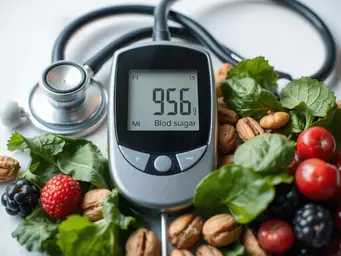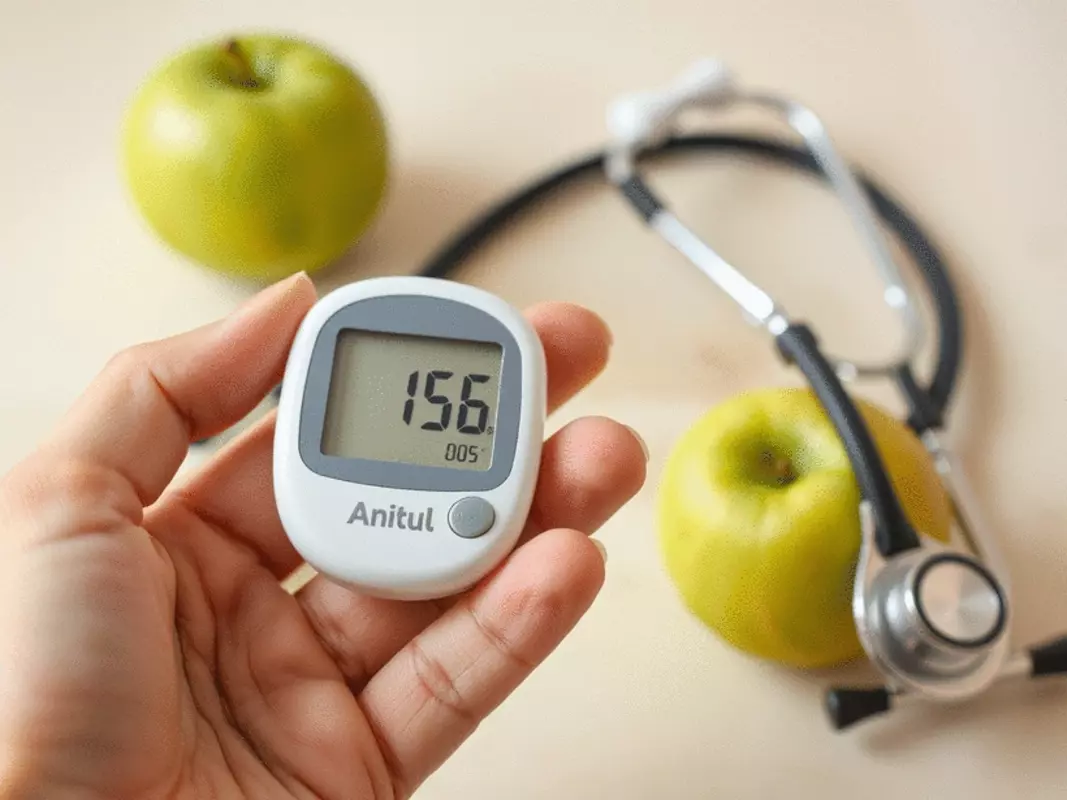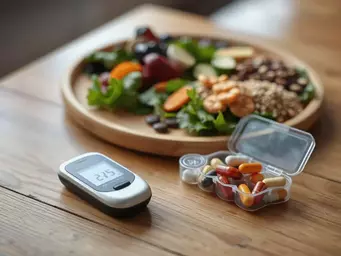Blood Sugar's Role in Diabetes
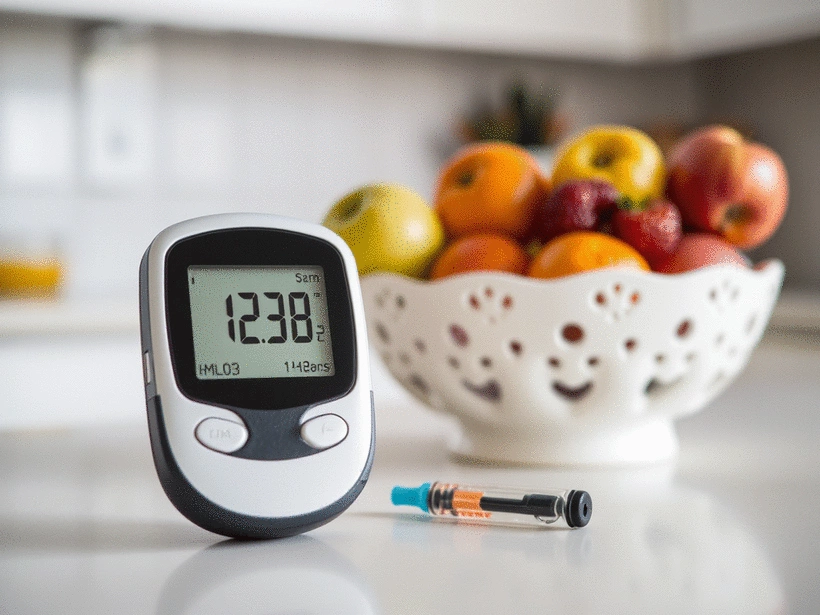
Did you know that maintaining balanced blood sugar levels is crucial for individuals with diabetes? The connection between blood sugar and diabetes management is key to preventing complications and enhancing overall well-being. Here’s what you can take away from this insightful article:
What You Will Learn
- Understanding the importance of regular blood sugar monitoring to prevent hypoglycemia and hyperglycemia.
- Recognizing how insulin interacts with blood glucose levels and its role in diabetes management.
- Identifying the different types of diabetes and their unique challenges regarding blood sugar control.
- Implementing lifestyle changes, such as a balanced diet and regular physical activity, to better manage blood sugar levels.
- Utilizing technology and health apps for effective diabetes management and monitoring.
Blood Sugar Dynamics in Diabetes Management
This visual illustrates the critical aspects of blood sugar management for individuals with diabetes, highlighting key actions and their impact.
Blood Sugar Range
Normal levels are 70-130 mg/dL before meals and below 180 mg/dL after meals.
Insulin's Role
Insulin helps cells absorb glucose. Type 1: no insulin. Type 2: insulin resistance.
Monitoring Frequency
Daily blood sugar checks are essential to track fluctuations and inform decisions.
Key Management Tools
Diet, exercise, and health apps/devices are crucial for effective control.
Understanding the Connection Between Blood Sugar and Diabetes
Understanding how blood sugar interacts with diabetes is crucial for effective management. Blood sugar, or glucose, is the primary energy source for our cells. For individuals with diabetes, maintaining balanced blood sugar levels is vital to prevent complications and ensure overall well-being. For comprehensive guidelines on managing diabetes, refer to the American Diabetes Association's Standards of Medical Care in Diabetes.
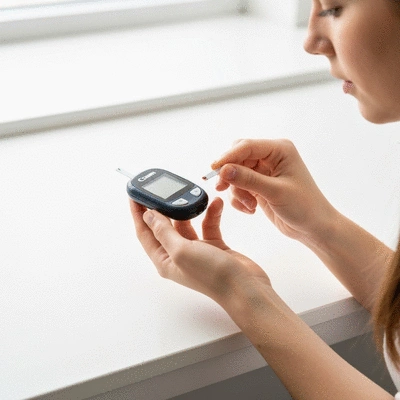
When we eat, our body breaks down food into glucose, which enters the bloodstream. In healthy individuals, the body regulates this process through insulin, a hormone produced by the pancreas. However, for those with diabetes, this regulation can be disrupted, leading to high or low blood sugar levels.
What is Blood Sugar and Its Role in Diabetes?
Blood sugar refers to the amount of glucose present in the bloodstream. It's essential for providing energy to our cells, but levels must remain within a specific range to prevent health issues. Normal blood sugar levels range between 70 and 130 mg/dL before meals and below 180 mg/dL after meals.
- Low blood sugar (hypoglycemia) can cause symptoms such as dizziness, confusion, and fainting.
- High blood sugar (hyperglycemia) can lead to long-term complications if not managed properly.
- Maintaining balanced blood sugar levels is vital for avoiding these extremes.
As a physician passionate about diabetes education, I emphasize the importance of understanding blood sugar and its role in diabetes management. By recognizing how food choices and activity levels affect blood sugar, individuals can make informed decisions about their health.
The Interaction Between Insulin and Blood Glucose Levels
Insulin is a key player in the regulation of blood sugar. When glucose enters the bloodstream, the pancreas releases insulin, which helps cells absorb glucose for energy. This interaction is a delicate balance; too much or too little insulin can lead to significant health issues.
- In Type 1 diabetes, the body does not produce insulin, requiring lifelong insulin therapy.
- In Type 2 diabetes, the body becomes resistant to insulin, often manageable through lifestyle changes and oral medications.
- Monitoring blood sugar and insulin levels is essential for effective diabetes management.
Understanding this interaction between insulin and blood glucose levels empowers patients to better manage their diabetes. By keeping track of how their body responds to various foods and activities, individuals can make healthier choices that contribute to improved blood sugar control.
Exploring the Types of Diabetes and Their Relationship with Blood Sugar
Diabetes is not a one-size-fits-all condition. It encompasses several types, each with unique characteristics and challenges related to blood sugar management. Let's dive into the different types of diabetes and how they affect blood sugar levels. For a deeper understanding of glucose metabolism and its impact, explore research on glucose and diabetes mellitus.
Did You Know?
Approximately 34.2 million Americans have diabetes, which is about 10.5% of the U.S. population. Understanding how to manage blood sugar levels is not just beneficial; it’s essential for millions of individuals striving for better health.
Summarizing the Impact of Blood Sugar on Diabetes Management
Understanding the connection between blood sugar levels and diabetes management is crucial for anyone navigating this condition. High blood sugar, or hyperglycemia, can lead to serious complications over time, affecting various organs and overall health. By maintaining stable blood glucose levels, individuals with diabetes can significantly reduce their risk of complications while enhancing their quality of life. Research on novel therapies for blood sugar control continues to evolve, offering new hope for improved management.
- Stable blood sugar helps prevent long-term complications.
- Regular monitoring is essential for effective diabetes management.
- Education and understanding empower healthier choices.
Moreover, acknowledging the intricacies of blood sugar dynamics allows us to better tailor our management strategies. By focusing on what impacts blood sugar, such as diet and exercise, we can create a proactive approach to diabetes care that resonates with our health goals.
Key Takeaways on Blood Sugar Control and Diabetes Complications
As I share insights on managing diabetes through blood sugar control, let’s distill the key takeaways that can guide your journey:
- Regular Monitoring: Keeping track of blood sugar levels is vital. Use logs or apps to identify patterns and make informed decisions.
- Balanced Diet: Incorporating whole foods and understanding the glycemic index can greatly affect your blood sugar response.
- Physical Activity: Engaging in regular exercise enhances insulin sensitivity and helps regulate blood sugar.

These practices not only assist in managing diabetes effectively but also promote a healthier lifestyle overall. Remember, every small step contributes to long-term success!
Encouraging Proactive Management and Regular Monitoring
In my experience at What Is Diabetes, I’ve seen the benefits of proactive management firsthand. Regular monitoring of blood glucose levels empowers individuals to recognize their body's signals and act accordingly. It’s essential to establish a routine that includes:
- Daily blood sugar checks to keep track of fluctuations.
- Setting goals for healthier eating and exercise habits.
- Consulting with healthcare providers regularly for personalized advice.
Taking charge of your health is a journey, and I encourage you to stay engaged with your diabetes management. Regular check-ins and adjustments based on your observations can lead to more favorable outcomes.
Next Steps for Effective Diabetes Management
Resources for Further Learning and Support
As you continue your diabetes management journey, I highly recommend seeking out reliable resources. At What Is Diabetes, we provide a wealth of information designed to enhance your understanding and empower you with knowledge. Here are some helpful avenues to explore:
- Educational Articles: Read through our extensive guides on diabetes-related topics.
- Support Groups: Join communities, both online and offline, for shared experiences and encouragement.
- Workshops and Webinars: Participate in sessions that offer practical advice and interactive learning.
Utilizing these resources can equip you with the tools and confidence needed to manage diabetes effectively.
Consulting Health Care Providers for Personalized Advice
Nothing beats the expertise of healthcare professionals when it comes to personalized advice. Regular consultations with your doctor, nutritionist, or diabetes educator can provide tailored strategies that suit your unique situation. Here’s how to make the most of your appointments:
- Prepare Questions: Write down any concerns or topics you want to discuss before your visit.
- Track Your Progress: Bring your blood sugar logs to show how well you’re managing your levels.
- Ask for Resources: Inquire about additional educational materials or local support groups.
By collaborating with your healthcare team, you can create a comprehensive management plan that addresses your specific needs and goals.
Utilizing Health Apps and Medical Devices for Better Management
In this digital age, technology offers incredible support for diabetes management. There are numerous health apps and devices designed to help track your blood sugar levels, diet, and activity. Consider these options:
- Glucose Monitoring Devices: Continuous glucose monitors (CGMs) provide real-time data about your blood sugar levels.
- Diet Tracking Apps: Use apps that help you manage your food intake and track carbohydrate counts.
- Exercise Trackers: Fitness devices can monitor your activity and remind you to stay active throughout the day.
Incorporating these tools into your daily routine can simplify your management efforts and give you valuable insights to improve your health.
Frequently Asked Questions About Blood Sugar and Diabetes Management
What are normal blood sugar levels for individuals with diabetes?
How does insulin affect blood glucose levels?
Why is regular blood sugar monitoring important?
What lifestyle changes can help manage blood sugar?
Can technology assist in diabetes management?
Recap of Key Points
Here is a quick recap of the important points discussed in the article:
- Understanding Blood Sugar: Normal blood sugar levels are crucial for preventing complications in diabetes management.
- Insulin's Role: Insulin regulates blood sugar levels, and its balance is essential for health.
- Types of Diabetes: Different types of diabetes require different management strategies for blood sugar control.
- Regular Monitoring: Keeping track of blood sugar levels helps in making informed health decisions.
- Healthy Lifestyle Choices: A balanced diet and regular physical activity positively impact blood sugar management.
- Utilizing Technology: Health apps and devices can enhance diabetes management by providing real-time data and insights.
